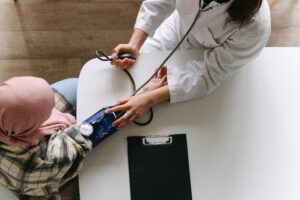Blog

All too often, we neglect the importance of good nutrition until we’re faced with a diagnosis of high blood pressure or high cholesterol.
At HeartCare Associates of Connecticut, our team of heart specialists understand that what you eat – or don’t eat – impacts your cardiovascular health. That’s why we offer customized nutrition programs and weight-loss services to get you back on track with a heart-healthy diet.
Our physicians also provide resources that help you make better food choices now, so you can prevent heart attacks and other cardiovascular diseases later.
3 key ways your diet plays a role in heart disease
Heart disease is a leading cause of premature death in the United States. While some underlying contributors to heart disease are out of your control, one of the biggest known factors is your diet.
Here are three ways a poor diet can significantly increase your risk for chronic heart disease and other serious health complications:
1. Too much fat
Your body requires a certain amount of fat to function optimally. However, too much fat can have a profound effect on your physical health.
Trans fats found in many processed foods like doughnuts and packaged cakes can increase your risk for type 2 diabetes. Eating too much saturated fat in things like beef, pork, butter, and cheese can lead to elevated cholesterol levels.
Cholesterol can eventually build up on your blood vessel walls and affect how well blood can flow to and from your heart.
Mono and polyunsaturated fats are the healthier fats you should incorporate into your diet in place of saturated and trans fats. These fats are found in salmon, avocados, olive oil, and sunflower seeds and can help reduce high cholesterol.
2. Too much sugar
Your body uses the sugar it gets from your diet and converts it into the energy your cells need to function. Consuming too much sugar can throw a monkey wrench in this process and increase your risk for heart disease, diabetes, and obesity-related complications.
The natural sugars found in fruits are much healthier than processed sugars in soda and cookies. However, to protect your heart health, it’s important that you follow a well-balanced diet that also incorporates leafy greens and other non-processed, no-sugar ingredients.
If you already have diabetes, you really need to stay on top of your diet to lower your risk for heart disease, nerve damage, and other diabetes complications. To keep your diabetes well controlled, be sure to take your medications as directed by your doctor and regularly check your blood sugar levels.
3. Too much sodium (salt)
Your body needs some amount of salt to maintain a proper balance of fluids, transmit nerve signals, and relax muscles in your heart and throughout your body.
Too much salt can lead to excess fluid buildup that puts pressure on your heart, increases your blood pressure, and increases your risk for chronic heart disease.
Following a low-sodium diet means eliminating prepackaged foods, processed meats, and salty snacks. Learn how to read labels when grocery shopping to ensure what you buy isn’t loaded with sodium, and opt for fresh vegetables and fruits as much as possible.
If you need to make changes to your diet but aren’t sure where to start, schedule a consultation at HeartCare Associates of Connecticut, LLC, today. Call the office nearest you or book an appointment online.

February is American Heart Month
Celebrate American Heart Month this February by raising awareness and taking simple steps to combat one of America’s greatest threats. Whether it means caring for your own health or sharing knowledge with loved ones, American Heart Month is your chance to take action – especially for women. In fact, cardiovascular disease is the number one

Easy New Year’s Healthy Habits You Can Actually Keep.
It’s a new year and many of us are feeling the pressure to set lofty goals. One study showed that 62% of adults feel that they have to set New Year’s resolutions. However, history tells us that many of these goals never come to fruition. Luckily there are simple ways to create healthy habits that

5 Ways to Deal with Holiday Blues and Find Joy Amidst Sadness
While the holiday season is often depicted as a time of joy, celebration, and togetherness, if you’re not feeling the holiday cheer, you’re not alone. About 41% of Americans surveyed, report feeling an increase in stress this year due to the holidays. The holidays can cause higher levels of anxiety and depression for many reasons.

5 Ways Diabetes Can Affect Your Heart
Diabetes is a chronic health condition that affects more than 100 million people in the United States! Managing diabetes or prediabetes is difficult on its own but these conditions also increase your risk of heart disease and stroke. November is National Diabetes Month, an annual observance dedicated to raising awareness about diabetes. This month, make

Are Allergies Affecting Your Heart?
Are you plagued by pesky fall allergies? You might be familiar with the runny nose, sneezing, coughing, and itchy eyes that come with seasonal allergies, but did you know it could have an effect on your heart? If you’re prone to allergies then it may surprise you to know that allergic disorders have a connection

5 Ways to Benefit from National Healthy Aging Month
Have you heard? September is National Healthy Aging Month! It’s a great reminder of the importance of regular health check-ups, which are fundamental for detecting and managing potential health issues early on. Routine screenings, vaccinations, and consultations with healthcare professionals can help prevent and manage chronic conditions, ensuring a higher quality of life as we









